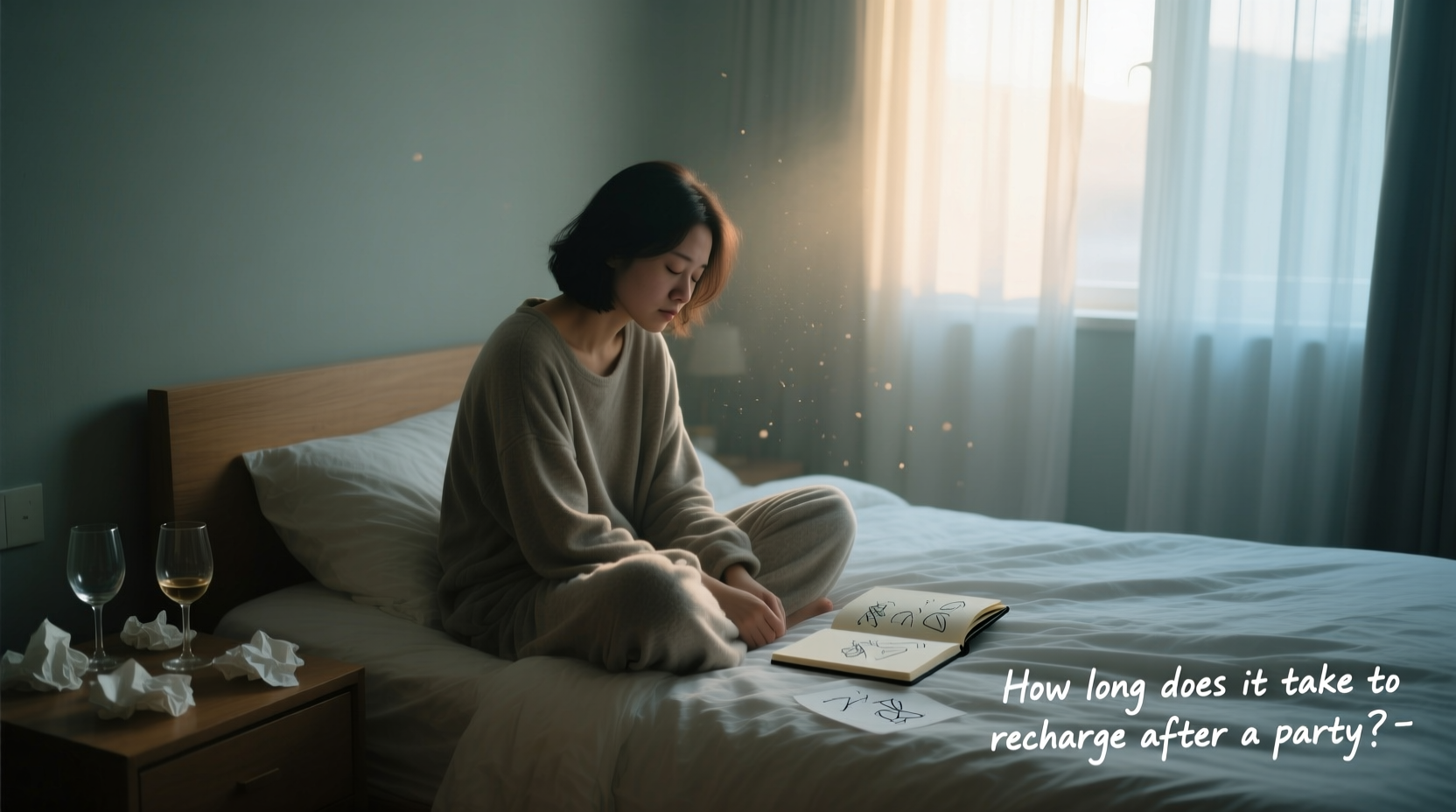After hours of forced small talk, loud music, and social stimulation, many introverts experience what’s commonly known as an “introvert hangover”—a state of emotional and mental exhaustion that sets in after social events. Unlike a physical hangover, this fatigue isn’t caused by alcohol but by overexposure to external stimuli. The aftermath can leave you drained, irritable, and mentally foggy. But just how long does it take to recover? And what factors influence the speed of your recharging process? This article explores the science behind introvert energy depletion, offers practical recovery timelines, and provides actionable strategies to restore balance efficiently.
The Science Behind Introvert Energy Drain

Introversion isn't just about shyness or disliking parties—it's fundamentally tied to how the brain processes stimulation. Neurological research shows that introverts tend to have higher baseline activity in their brains' prefrontal cortex, the region responsible for decision-making, self-control, and complex thought. Because of this, they reach cognitive saturation faster than extroverts when exposed to high-stimulation environments.
Dr. Marti Olsen Laney, author of *The Introvert Advantage*, explains: “Introverts process more information per neural pathway than extroverts. That means even pleasant interactions require more internal processing, which leads to quicker mental fatigue.”
When an introvert attends a party, every handshake, laugh, and conversation—no matter how enjoyable—requires sustained attention, emotional regulation, and social navigation. Over time, these micro-efforts accumulate into significant psychological load. Once the event ends, the nervous system needs time to downshift from high alert back to a restful state.
“Social interaction is not inherently draining—but for introverts, managing constant input without downtime leads to depletion.” — Dr. Laurie Helgoe, Psychologist and Author of *Introvert Power*
Typical Recharge Timelines After Social Events
There’s no universal answer to how long an introvert takes to recover after a party—the timeline depends on several variables:
- Duration and intensity of the event
- Number of people present
- Level of personal engagement (e.g., hosting vs. observing)
- Pre-existing energy reserves
- Available post-event recovery time
That said, most introverts fall into one of three recovery categories based on event type:
| Event Type | Average Recovery Time | Recovery Characteristics |
|---|---|---|
| Casual Gathering (4–6 people, 2–3 hours) | 6–12 hours | Mild fatigue; restored with quiet evening at home |
| Larger Party (10+ people, 4+ hours) | 1–2 days | Significant mental fog, need for solitude, possible irritability |
| High-Stimulus Event (wedding, conference, networking) | 2–4 days | Deep exhaustion, reduced focus, strong desire for isolation |
These estimates assume minimal recovery efforts. With intentional recharging practices, some individuals report cutting recovery time in half.
Step-by-Step Recharge Timeline: From Post-Party to Full Restoration
Recovery isn’t passive. While sleep helps, true restoration requires deliberate actions that align with your neurology. Here’s a science-informed, four-phase approach to accelerate recovery:
- Phase 1: Immediate Decompression (0–2 Hours Post-Event)
As soon as the social pressure lifts, engage in low-cognitive-load activities. Avoid checking work emails or jumping into intense conversations. Instead:- Take a quiet walk
- Listen to calming instrumental music
- Sip herbal tea in silence
- Avoid screens if possible
- Phase 2: Emotional Processing (Evening of the Event)
Reflect gently on the experience without judgment. Journaling helps discharge lingering thoughts:- What moments felt energizing?
- When did you first notice fatigue setting in?
- What would you do differently next time?
- Phase 3: Deep Restoration (Next 24–48 Hours)
Prioritize solitude and sensory reduction. Ideal activities include:- Reading fiction
- Meditation or breathwork
- Spending time in nature
- Engaging in creative hobbies (drawing, journaling, playing music)
- Phase 4: Gradual Reintegration (Day 3 Onward)
Slowly reintroduce light social contact. Start with one-on-one conversations or brief check-ins. Monitor your energy closely. If fatigue returns, scale back. Full readiness is indicated by spontaneous interest in connection—not obligation.
Mini Case Study: Recovering from a Wedding Weekend
Sarah, a freelance editor and self-identified introvert, attended her best friend’s destination wedding—a three-day event filled with group dinners, speeches, and mingling. Though she enjoyed seeing loved ones, she returned home feeling emotionally hollow and physically sluggish.
She expected to “bounce back” in a day but found herself canceling client calls and avoiding texts on Day 2. Only after implementing structured recovery did she regain clarity. Her plan included:
- Immediate decompression: A silent 30-minute walk upon returning home
- Journaling: Wrote three pages processing the weekend’s highs and lows
- Protected downtime: Took two full days off work, limited screen time, read novels
- Nature immersion: Spent Saturday morning in a local park with a sketchbook
By Monday, Sarah reported feeling “like myself again.” She noted that without the intentional reset, she likely would have carried residual fatigue into the following week, affecting productivity and mood.
Checklist: Essential Actions for Faster Recharging
To minimize the duration and impact of an introvert hangover, follow this post-party checklist:
- ✅ Leave the event with intention—don’t linger past your threshold
- ✅ Schedule at least half a day of unstructured time afterward
- ✅ Create a “recharge zone” at home: dim lighting, comfortable seating, noise-canceling headphones
- ✅ Limit digital stimulation (social media, news, messaging apps)
- ✅ Hydrate and eat nourishing meals—blood sugar crashes worsen mental fatigue
- ✅ Practice 5–10 minutes of mindfulness or box breathing
- ✅ Use scent or sound cues (e.g., lavender oil, soft instrumental playlist) to signal safety to your nervous system
- ✅ Communicate boundaries: Tell housemates or family you need quiet time
Common Misconceptions About Introvert Hangovers
Many well-meaning friends and colleagues misunderstand the depth of post-social fatigue. Common myths include:
- “You’ll feel better once you get used to it.” – Acclimation doesn’t eliminate neurological differences. Introverts may adapt behaviorally but still pay an energy cost.
- “Just push through—you had fun, didn’t you?” – Enjoyment doesn’t negate exhaustion. You can love an event and still need recovery.
- “A nap will fix everything.” – While sleep helps, true restoration requires mental and emotional decompression, not just physical rest.
- “You’re being antisocial.” – Solitude after socializing is a form of self-care, not rejection of others.
Understanding these distinctions helps introverts advocate for their needs without guilt.
Frequently Asked Questions
Can extroverts experience introvert hangovers too?
Yes—though less frequently. Extroverts gain energy from socializing, but even they can become overwhelmed in excessively stimulating environments (e.g., crowded festivals, non-stop networking). Their recovery is usually shorter, often within hours, because their baseline arousal is lower and social interaction replenishes rather than depletes them.
Is it normal to feel guilty after withdrawing post-party?
Very common, but unnecessary. Guilt often stems from societal pressure to be constantly available and upbeat. Remind yourself that recharging is not laziness—it’s maintenance. Like charging a battery, downtime enables future engagement. Self-compassion reduces recovery time by preventing secondary stress.
What if I don’t have time to recharge?
In unavoidable situations—such as work events followed by early meetings—prioritize micro-recovery. Even 15 minutes of solitude, deep breathing, or listening to calming music can interrupt the stress cycle. Plan short breaks throughout the next day. Consistent mini-resets are better than none.
Conclusion: Honor Your Rhythm, Restore Your Energy
An introvert hangover isn’t a flaw—it’s a natural response to exceeding your cognitive and emotional bandwidth. Recovery times vary, but most introverts need anywhere from half a day to four days to fully recharge after a party, depending on the event’s demands. What matters most isn’t eliminating social fatigue entirely, but learning to recognize its signs and respond with compassion.
By integrating structured recovery phases, creating supportive environments, and challenging misconceptions, you can shorten your rebound time and maintain stronger mental resilience. Remember: solitude isn’t isolation. It’s where you return to yourself, refuel, and prepare for meaningful connection on your own terms.









 浙公网安备
33010002000092号
浙公网安备
33010002000092号 浙B2-20120091-4
浙B2-20120091-4
Comments
No comments yet. Why don't you start the discussion?